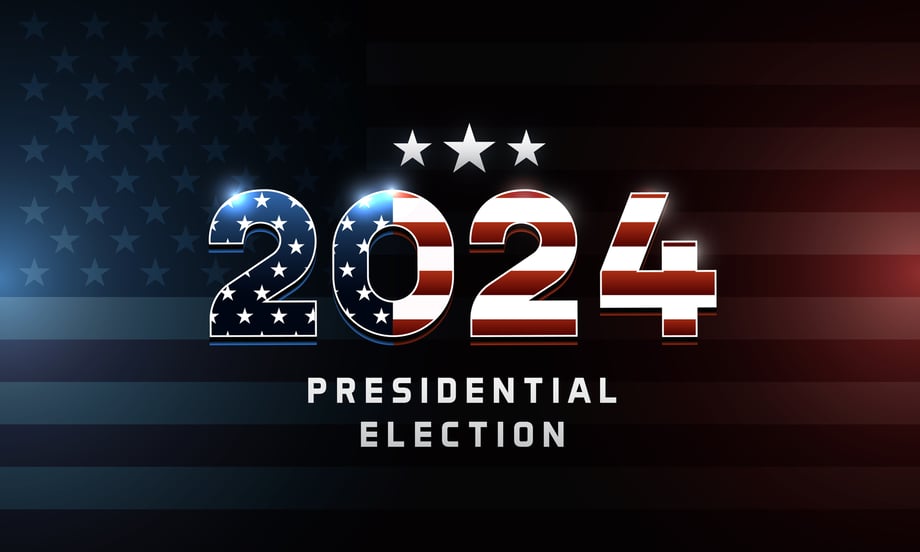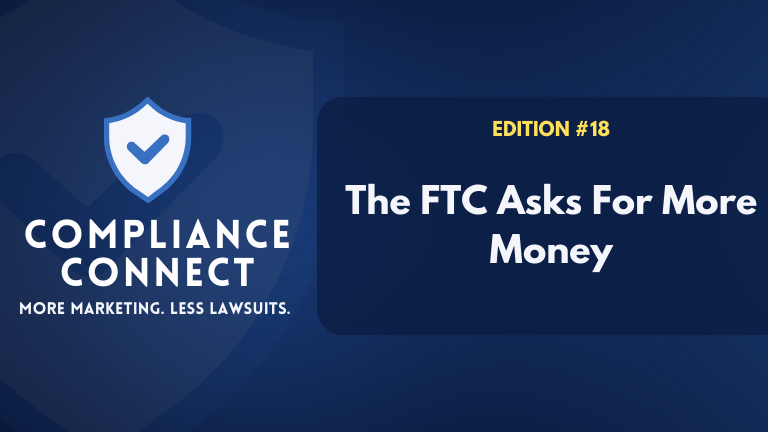Good morning! This is the eighteenth edition of the Compliance Connect newsletter.
The goal is simple: to keep you in the loop on what the FTC and other regulatory agencies are up to so that you can protect yourself.
These newsletters will land in your inbox twice a week – Mondays and Thursdays.
Remember: this is NOT legal advice, only information!
Here’s the rundown today…
- 💰 FTC’s Big Budget Request
- 📲 Text Message Compliance Guidelines
- ❌ FTC’s New Click To Cancel Rule Explained
- 💸 Surprising Refund Statistics
- 🗳️ The Stakes Of The Election For The FTC
Compliance Digest: What You Should Read Today
FTC Asks For $535 Million In Funding For 2025 Fiscal Year
Back in March, the FTC submitted its budget request for the 2025 fiscal year. The amount they asked for was $535 million. This is an increase of $105 million from before.
This is an interesting document because it lays out the accomplishments the FTC is most proud of, along with what it anticipates its priorities will be during the next year.
So, what does the FTC want to do with the extra money?
- Hire 55 additional full-time employees, with the largest group of new hires allocated to supporting anti-trust investigations
- More money for contracts with expert witnesses
- Upgrades to IT and cybersecurity
- New office construction
- Other expenses
Common Text Message Violations Explained
Many businesses unknowingly violate the Telephone Consumer Protection Act (TCPA). We usually talk about it in the context of calling prospects on the phone, but what about text messaging (SMS)?
This article breaks down the ins and outs of the TCPA and how it impacts SMS marketing.
The author explains what counts as a violation, the potential penalties, and steps to keep your texts compliant.
If your business is thinking about any kind of mobile marketing, then you need to understand these rules!

What’s In The New Click To Cancel Rule?
A couple of weeks ago, the FTC introduced a “click-to-cancel” rule to make canceling recurring subscriptions as simple as signing up.
This rule addresses the problem of companies making it difficult for consumers to end memberships, which can lead to unwanted charges.
TLDR: Check out this useful fact sheet created by the FTC
I’ve given a brief overview of the rule in a previous edition of the newsletter, but I wanted to dive a little deeper.
Why The Rule Exists
All of us have signed up for subscriptions or memberships that we forget about and get charged for even though we don’t use them.
Most businesses that sell subscriptions are legitimate businesses selling legitimate things. They are easy to cancel, and many will refund you even if they don’t technically have to.
Unfortunately, subscriptions have been used by some businesses to deceive customers. Often they would hype a cheap/free trial and then in the fine print say that they’ll charge you $25/month if you don’t cancel within 30 days.
Many customers are then surprised when they are charged. Worse some customers don’t notice the charges until many months have passed.
Even more frustrating, customers found it MUCH harder to cancel than it was to sign up.
That led to Congress passing the Restore Online Shoppers Confidence Act (ROSCA), which regulated online subscription offers. Some states like California have passed their own regulations.
These rules that the FTC just announced build off regulations like these.
What The Click To Cancel Rules Say
The new rules apply to “negative options.” These are subscriptions that renew unless the customer proactively cancels them.
Here are what the new rules say…
- Key details must be honest, transparent, and easily accessible.
- Customers need to fully understand what they’re signing up for before they commit.
- Sellers must provide proof that customers clearly understood and accepted the terms before signing up.
- The cancellation process must be as simple and quick as the sign-up process.
- Violators may face fines and be required to offer refunds or compensation.
The rule applies to most “negative option” offers. They will go into effect 180 days after publication in the Federal Register.
What The Rules Do NOT Say
There were two major things that the new rules do NOT do…
- Does NOT require businesses to give an annual reminder of the membership.
- Dos NOT require sellers to first ask customers if they want to hear an offer before cancelling their memberships.
These were a part of the original proposed rule, but were not included in the final rule.
You are still allowed to “save the sale” as long as you don’t impede a customer’s ability to cancel.
However, you need to pay attention to state law.
For example, in California you DO need to send an annual reminder about the subscriptions cost and how to cancel, among other requirements.
Did You Know…
In 2023, the FTC sent $137.7 million in refunds for customers.

Reup: Will Trump Or Harris Change The FTC?
There’s a big election tomorrow. The FTC hasn’t come up much during this campaign. However, the winner will have an opportunity to make their mark on the agency.
That’s why I wanted to reup this analysis from the September 12th newsletter of how the election might impact the FTC.
What kinds of changes could we expect, and what does it mean for businesses and marketers?
Some people believe that if Trump gets elected, there will be BIG changes with the FTC and other regulators.
Some even believe that businesses and marketers will be able to say whatever they want!
Is this true? Let’s look at the facts.
TLDR:
- The leadership of the FTC might change
- The FTC’s big-picture focus could change, especially around anti trust
- The people doing the day to day work won’t change
- The underlying laws probably won’t change
- Courts will probably continue to be more hostile to regulators
- You’ll still need to follow the rules regardless of who wins
#1 – FTC Leadership Might Change
The president has the power to appoint the chair of the FTC. Lina Khan, appointed by President Biden, holds that position right now.
Harris might keep the current chair since they belong to the same party.
She might also make a change. There have been reports that she is being urged by some of her donors to replace Lina Khan.
If the Republicans take control of the Senate, which they are favored to do, then she would have to appoint someone who could win the votes of Republicans who are skeptical of government regulations.
If Trump wins, he’ll pick a new leader for the FTC who matches his ideas, just like he did in his first term.
This person will likely have different priorities than Lina Khan. Which leads us to…
#2 – FTC Priorities Might Change…
Under the leadership of Lina Khan, the agency has prioritized anti trust.
The FTC has sued companies like Amazon for “maintaining monopoly power.” They’ve also passed new rules, such as the ban on non-competes, to promote competition.
Republican members of the FTC, along with Republicans in congress, have opposed many of these actions.
If Trump appoints a new chair that aligns with the views of most Republicans, then the FTC will deemphasize anti trust. They might drop or settle some ongoing lawsuits and roll back some recent rules.
#3 – …But Not As Much As You Might Think
Many of the actions the FTC takes have support in both parties. For example, the recent FTC rules on fake reviews & testimonials were approved by a unanimous vote from both Republican and Democratic committee members.
There are even Republicans who like the FTC’s recent anti trust focus.
For example, Trump’s running mate JD Vance said in February that, “I guess I look at Lina Khan as one of the few people in the Biden administration that I think is doing a pretty good job.” He specifically praised her on anti trust issues.
In 2020, during the Trump administration and led by a Trump-appointed chair, the FTC sued Facebook for anti trust violations.
The FTC’s anti trust focus might continue even if Trump appoints a new chair.
#4 – The People Handling Investigations Probably Won’t Change
While the chair of the FTC matters, the people who actually handle investigations and decide who to file lawsuits against are usually career staff who have been there for years.
That means regardless of who wins the election and appoints the next FTC chair, most of the DAY-TO-DAY work would stay the same.
#5 – The Underlying Laws Probably Won’t Change
The Federal Trade Commission Act— the law that says what businesses can and can’t do in their ads—won’t change without a vote from Congress.
These lawsuits that we talk about in this community are brought because the targets are accused of violating parts of the FTC Act.
Regardless of who wins the presidential election and which parties control congress, there’s no indication that the FTC Act will change.
That means the basic rules prohibiting misrepresentations and other deceptive practices probably won’t change.
#6 – Courts Will Probably Continue To Be More Hostile To Regulators
Republican presidents tend to appoint judges who are skeptical of government regulations.
For example, the recent string of Supreme Court decisions weakening regulatory agencies have been driven by Republican-appointed justices.
If Trump wins the election, and the Republicans take control of the Senate, then we could expect more appointments of judges skeptical of regulators to be confirmed.
If Harris wins and Republicans control the Senate, it’s not clear if she’ll get to appoint any judges at all.
If the Democrats hold the Senate, then she would be able to appoint judges. However, it’s unlikely that there would be enough vacancies to change the current balance of the court.
Bottom Line
While it is true that the upcoming election impacts the FTC, for the vast majority of the readers of this marketers and business owners will still face the same level of risk with lawsuits if they are NOT compliant.
Remember: The FTC is NOT the only risk. There are other agencies, state AG’s, class action lawsuits and more.
Our advice is the same: learn the rules. Follow the rules. Stay informed of any changes.
For more on the election’s implications for compliance, check out this episode of the Don’t Say That podcast.
